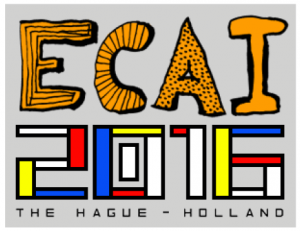It is not news anymore that AI is a hot topic. In Europe, many new initiatives have been started recently to address various aspects of the development and application of AI. All the while, existing AI organizations try to resync themselves with the current state of affairs. More and more parts of society want to be heard in the discussions revolving around AI. It’s not only a topic for academics anymore. Businesses and the general media are shaping the AI narrative. Concerned civil society groups are getting more involved as well. It’s time for a closer look.
- Full Professor, Umeå University
Sep 2018 – Present - Expert Member, High-Level Expert Group on AI of the European Commission
June 2018 – Present - Fellow, EurAI
June 2018 – Present - Associate professor, Delft University of Technology
Nov 2009 – Aug 2018
For this editorial, I interviewed prof. dr. Virginia Dignum about the current state of the discussion around AI in Europe. In June 2018, prof. Dignum was appointed as a fellow of the European Association for Artificial Intelligence (EurAI) and was selected for the High-Level Expert Group on Artificial Intelligence (AI HLEG) of the European Commission.
In April 2018, the European Commission released a communiqué arguing for putting AI at the service of Europeans and stimulating Europe’s competitiveness regarding the development and application of AI. “The European Commission is taking these steps because they feel they are losing the `AI race’, whatever that means. They want to ensure that Europe does not lose the race,” says prof. Dignum, who was involved in the creation of the communiqué. “I don’t really believe that we should look at it as a race, because if it is a race than there are by definition winners and losers. And if there is a clear winner, then we all lose, including the winner.”
Prof. Dignum argues for a different approach. “We have to ensure that everybody wins”. She believes that Europe can and should have a leading role in shaping the discussion and developments around AI. “Europe has a different approach to researching and developing AI than most other parts of the world. For example, the United States, as a country, has no clear strategy on AI. It all comes from the big tech companies like Google, Facebook, and Amazon. In China, there is some national strategy, but again, they also have very big players like Tencent and Alibaba. In Europe, we don’t have companies of those dimensions. Human values and participation are more embedded at the core of European approaches, also for AI. We want to ensure that everybody is treated fairly. Those values are core to Europe. This is also one of the reasons why the GDPR was put forward. Europe can influence the rest of the world by taking a proactive approach in shaping the AI narrative and providing guidelines for the use of AI for good.”
The most recent step by the European commission is the foundation of the High-Level Expert Group on Artificial Intelligence (AI HLEG). Prof. Dignum is a member of this group. “We are tasked with two things. The first is to identify the ethical principles that should guide the use and development of AI in Europe. The second is to provide strategies and guidelines for the policies and investment in AI in Europe. We have until December/January to come up with recommendations for the European commission to design the new multi-year strategy and budget for Europe.”
The AI HLEG consists of members from different parts of society. Academics are joined by businesses and civil society groups. Prof. Dignum remarks that there are still a lot of misconceptions about what AI is. “During the first meeting we spent a lot of time discussing and defining what AI is and what it is not.” This is not strange according to prof. Dignum. “Because there are two main issues. The media is being extremely sensationalistic and misleading about what AI is and what it is not. This creates a biased idea of what AI is about. We should really be on top of shaping a proper AI narrative. The second thing is that we should bring AI more into general education. At least give children a basic idea about what an algorithm is and what it means for a machine to learn. People should know this as soon as possible. Us researchers should take more responsibility in communicating what AI is and what it is not.”
I asked prof. Dignum if this responsibility holds for all AI researchers. “Yes, in principle, it holds for all researchers, but for senior researchers, this responsibility is bigger.” I wondered whether the European Association for Artificial Intelligence (EurAI) should play a role in shaping the AI narrative. EurAI aims to promote the study, research, and application of Artificial Intelligence in Europe. Its primary focus lies on the academic community. Its members are the national AI associations, like the BNVKI. The top senior AI researchers in Europe can be nominated to be an EurAI fellow.
I asked prof. Dignum, a newly appointed EurAI fellow, if she sees a role for EurAI in shaping the AI narrative. “EurAI, founded in 1982, is rooted in the more classical AI and it is struggling to resync itself with the current state of the AI discussion. They are re-discovering what the role of EurAI is in all this. Traditionally it’s a platform for academics to connect and discuss their research”. She goes on to say that she thinks “it is more expected of fellows to act like ambassadors of academic research in AI. They need to participate in activities at a European level and a national level to bring forward the academic voice into the discussion about AI”.
Prof. Dignum notes that “there are all kinds of groups on all kinds of levels discussing AI. The most important thing is that there is this awareness that AI is going to affect us and we better be on top of it. Whether the AI HLEG or EurAI are the best ways to approach this is not the point, it’s that we are actively having this discussion”.
Another example of AI researchers taking responsibility in taking a leading role in the AI discussion is CLAIRE. CLAIRE is a confederation of laboratories for artificial intelligence researchers in Europe. It wants to promote the European human-centered approach of AI. Their website states that “it is not only Europe that needs AI made in Europe.” They want to achieve their goals by creating a “pan-European network of Centers of Excellence in AI, strategically located throughout Europe, and a new, central facility with state-of-the-art, `Google-scale’, CERN-like infrastructure – the CLAIRE Hub”. The BNVKI is one of the supporters of CLAIRE.
My brief dive into the state of the AI discussion and the involved organizations has lead me to realize that AI research and development in Europe has a clear human-centered identify. And that the first steps have been made on a governmental level and on an academic level to bring forward this message to companies, the citizens of Europe, and the rest of the world. This made me wonder. Are we doing enough to shape the AI narrative in the Benelux? Do we have a distinct identify for AI `made’ in the Benelux as well?
I hope to see you all at the upcoming BNAIC to discuss these questions with me.

